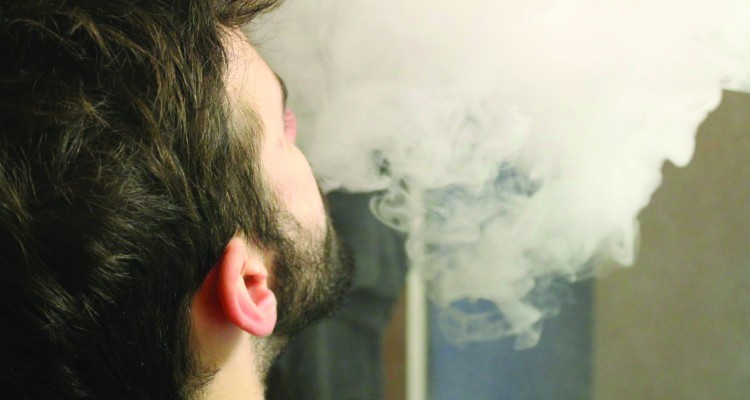More U.S. college students are smoking marijuana on a daily basis, roughly 6 percent, than they have since 1980, according to a study by the University of Michigan in 2015.
According to Assistant Director of the Department of Public Safety John Ritchie, the increasing trend of students smoking marijuana on college campuses is prevalent at Fairfield as well.
“I think marijuana use is an issue in society, so our campus is not exempt from that at all,” Ritchie said. “I think people are spending too much money, too much time, too much effort in getting high, instead of concentrating on their academic studies.”
Associate Dean of Students William Johnson agreed that marijuana use amongst the student body is an issue, saying “possession of marijuana is illegal, so therefore we have an obligation to address it on our campus.”
Despite the use of marijuana on campus, Johnson feels that the University does a good job in addressing these cases and finding appropriate disciplinary measures for these students.
Johnson spoke of the various sanctions the Dean of Students office uses for these matters. “It could be a range of things from warnings, to education, to removal from housing, fines. It depends on if it’s your first offense or your second offense, depends on how much you have,” Johnson said.
He added that what he finds to be the most concerning about students’ marijuana use is when students cover the smoke detectors in their dorm rooms to stop them from going off while they’re smoking, tampering with fire safety and putting the lives of others at risk. According to Johnson, he has seen students use a variety of mechanisms to do so, such as plastic bags and paper.
Connecticut is one of several states that have decriminalized marijuana in the past few years. While people can smoke marijuana in the state without punishment, as a private institution, Fairfield does not have to stop reprimanding marijuana use on campus, and thus, the University has maintained its current policy in dealing with marijuana related cases.
However, Johnson acknowledged that if marijuana becomes legalized in Connecticut or further on a federal level, the University would most likely reconsider its policies regarding marijuana use on campus.
“I think if marijuana becomes legalized we’d have to take a hard look at our policy, and what are the implications for a policy as we have instated versus what state and/or federal law might dictate about the possession and use of marijuana,” Johnson said.
Johnson pointed out that the University won’t be forced to take any specific actions if marijuana becomes legalized because “as a private university, we do have the ability to dictate our policies as we see fit, as long as it’s not in violation with anyone’s civil rights.”
He went on to explain that “if the state does legalize [marijuana], making it not illegal anymore, does that mean that we can’t say that marijuana is still illegal on our campus? No, we can still say that you can’t smoke marijuana on our campus.”
Johnson compared this to smoking tobacco or having a gun on campus, saying that just as these practices are legal, they still aren’t legal on campus, and are thus punishable actions. According to Johnson, the same would apply for marijuana if it was legalized.
DPS would also have to shift its policies if marijuana becomes legalized, Ritchie said.
“We’d have to revisit what the Clery Report requires us to report, and we’d have to look and see how that adjusts our reporting of marijuana, because we might actually remove it,” Ritchie said. “Federally we would have to report crimes and drug arrests, but I think we could operate off of state laws. You wouldn’t get arrested for marijuana if it’s legal, so I don’t think we’d have to report that.”
He added that if marijuana was to become legalized in the state, marijuana use on campus would become a policy violation “kind of like having a candle in your room.”
Sophomore Nicole Kwasnaza thinks it’s reasonable that the University update its policies once marijuana is legalized. “I believe that the student policies should be updated to accommodate for the legalization. However, they should be strict enough to prevent the use amongst students from getting out of control,” Kwasnaza said.
Many feel as though the University should wait until marijuana becomes legalized before changing these policies any further because while marijuana use is an issue on campus, it’s not necessarily the most significant one.
Ritchie feels that the University could do more to prevent students from smoking marijuana, but feels that this wouldn’t be realistic given that the University should be focusing on more pressing issues, such as sexual assault.
Kwasnaza agreed, saying, “I do think the use of marijuana this campus is widespread, but I don’t believe it’s a major issue that requires immediate attention.”
Freshman Alec Lurie feels that the University shouldn’t worry about taking further measures to cut down on marijuana use on campus because he doesn’t believe it to be as dangerous as other drugs.
“I don’t think marijuana is such a big issue on campus,” Lurie said. “Even though it is an illegal substance I believe it is far less damaging than legal drugs like alcohol and prescription pills like Adderall. I’ve never heard of anyone having their stomach pumped because they smoked one too many.”
“I’m not worried about marijuana use on campus nor in general,” Lurie added.


Leave a Reply